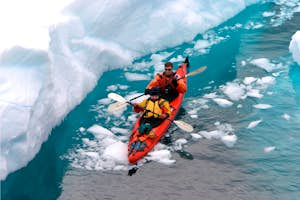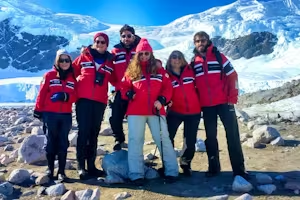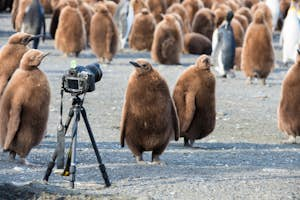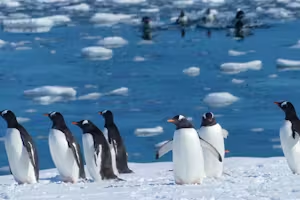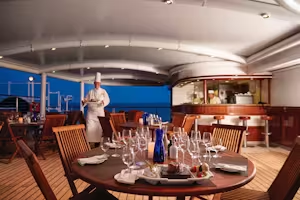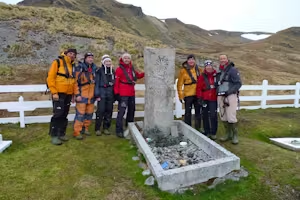Avian Flu & South Georgia
- Avian Flu has been present on South Georgia since late 2023, having been introduced naturally by migrating birds
- The arrival of Avian Flu was anticipated and plans were already place to manage its effects
- Simple biosecurity procedures have allowed cruise ship operators to continue visiting South Georgia, with landing sites remaining open to visitors
- Swoop has sent many hundreds of travellers to South Georgia throughout this period, with our customers having brilliant wildlife experiences
- We're constantly monitoring the situation so we can keep all our travellers fully informed throughout their journey with us
What is Avian Flu?
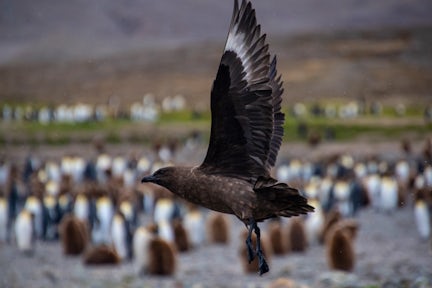
Avian Flu is a naturally existing virus found in wild bird populations that is spread by faeces and respiratory secretions. While most strains of the virus are harmless, the H5N1 strain (also known as Highly Pathogenic Avian Influenza or HPAI) carries a much higher risk to animals. Although it mainly affects birds, a substrain has been shown to affect some wild mammal species living in close quarters with infected birds. It carries a very low risk to humans.
Since 2020, the HPAI strain has been spread by migratory birds across Asia, Europe and North and South America, causing widespread mortality, particularly among seabird populations. In late 2023 it arrived on South Georgia. Its effects have mainly been seen among skuas, elephant seals and fur seals.
Visiting South Georgia safely

The introduction of Avian Flu to South Georgia in late 2023 by migrating birds was an event that had been planned for. A management plan devised by the Government of South Georgia & the South Sandwich Islands was quickly put into place, while the International Association of Antarctic Tour Operators (IAATO), stepped up precautionary biosecurity measures for all ships and visitors that had been introduced in 2022. Swoop is proud to be a member of IAATO.
All locations visited by cruise ships across South Georgia that season remained open for zodiac cruising, although a number of landing sites were temporarily closed where Avian Flu had been recorded, primarily in skuas or elephant seals.
Since then, improved scientific advice allowed landing sites to fully reopen – including all the king penguin colonies so beloved by visitors.
Swoop has continued to send hundreds of travellers to South Georgia. We have stayed in constant contact with all our passengers to keep them updated about Avian Flu where necessary. The feedback we received from returning guests was some of the best we've ever received, confirming something we've always known: that South Georgia offers one of the greatest wildlife spectacles on the planet.
What Swoop travellers have loved recently about South Georgia
What this means for your trip
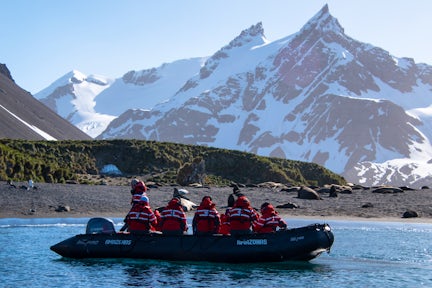
South Georgia has continued to remain fully open for exploration. Improved scientific understanding of Avian Flu has allowed the Government of South Georgia & the South Sandwich Islands to relax its guidance to keep landing sites open, and cruise ships continue to visit the island, with expedition teams bringing their experiences from the last season to offer passengers a sensational wildlife experience.
What you can expect from South Georgia this season:
- Discretionary landings Shore landings are permitted, subject to increased scouting by guides for signs of Avian Flu before guests leave the ship, and provided guests adhere to the simple biosecurity rules and can maintain a safe distance from wildlife.
- More zodiac excursions Zodiac cruising has always been a key component of any trip to South Georgia and often provides the best platform for wildlife watching when the weather or sheer density of animals on shore makes landing impractical. An increased focus on zodiac cruising allows you to appreciating the sheer mass of South Georgia's wildlife set against a backdrop of majestic mountains and glaciers.
- Biosecurity measures All efforts will continue to ensure that visitors aren’t an added vector for Avian Flu, which means easy to follow biosecurity measures. These include the need for thorough cleaning of your kit and boots both before and after landings, as well as a ban on sitting, kneeling or squatting on the ground. Your expedition team will cover this in detail when you’re aboard.
- Flexible itinerary Travelling in such southerly latitudes always comes with challenges and demands a degree of nimbleness and evolution when it comes to the actual daily itinerary. Cruise operators have learned an immense amount about operating successfully around Avian Flu in recent seasons, and now put that experience to work – visiting popular landing sites and adapt the ship's programme if necessary to offer the best that South Georgia has for visitors.
Swoop continues to monitor the situation, staying in close contact with all our ship operators as well as getting regular updates from the Government of South Georgia & the South Sandwich Islands.

Swoop says
Expedition teams learned an enormous amount last season about successfully operating under Avian Flu while still showing off the best of South Georgia, with decisions on which locations to visit being daily by your ship's Captain and Expedition Leader, just as they have always been.
Has Avian Flu affected Antarctica or the Falkland Islands?
Avian Flu was first detected on the Antarctic Peninsula in February 2024. This had been anticipated and planned for, and biosecurity measures in places since 2022 meant that cruise ships have continued operating as normal, with no itinerary changes required.
Should Avian Flu require some locations to be temporarily closed for landings, the size of the Antarctic Peninsula, and the number and variety of its landing sites give ships great flexibility in avoiding affected areas. Zodiac cruising and activities like kayaking, camping and whale watching will all continue as expected.
The Falkland Islands has registered a tiny number of Avian Flu cases but the majority of landing sites have remained open, with visitors following the same simple biosecurity procedures as for South Georgia and Antarctica.

Avian Flu & South Georgia: FAQs
-
How will my trip to South Georgia be affected?
All landings on South Georgia are permitted at the discretion of a ship's expedition team, provided there are no visible signs present of Avian Flu and guests can maintain a safe distance from wildlife.
All visitors will continue to participate in the simple biosecurity procedures already in place in South Georgia, such as disinfecting boots. To prevent the possibility of accidental transmission during a landing, it's not permitted to sit, kneel or squat on the ground, or place bags on the ground. Your expedition team will talk you through these procedures before you arrive in South Georgia.
We'll be keeping this page regularly updated in case the situation changes.
-
Will I still get to see South Georgia's wildlife?
Yes! Your expedition team will work hard and use their experience from past seasons to ensure you have the best experience possible.
Itineraries are never set in stone and South Georgia by nature is unpredictable. In some instances, you might find yourself taking a zodiac cruise to see wildlife instead of making a landing – something that's not uncommon in South Georgia, when the amount wildlife on the beaches can sometimes be so astonishingly dense as to make landings impossible.
As with any polar adventure, it's best to expect the unexpected and go with the flow.
-
What are the risks of Avian Flu to wildlife in South Georgia?
Avian Flu is a highly contagious disease that primarily affects birds, but it is also known to affect mammals – including species like seals who are often found in association with seabirds. The risk to wildlife is great, which is why the biosecurity measures already in place are so important.
In South Georgia, Avian Flu has been shown to particularly affect brown skuas, kelp gulls, giant petrels, elephant seals and fur seals.
At Swoop, we closely adhere to the biosecurity guidelines put in place by the Government of South Georgia & the South Sandwich Islands, along with those provided by IAATO working across Antarctica.
-
Does Avian Flu carry any risk to humans?
While it’s possible that Avian Flu can be transmitted to humans, the practical risks are very low and require continuous close contact with an infected animal.
-
What about the Antarctic section of my trip?
Avian Flu was first detected on the Antarctic Peninsula in February 2024. Thanks to biosecurity measures in place since 2022 and the large number of potential landing sites on the Peninsula, this not resuledt in the alteration of any expedition cruise ship itineraries.
During your trip you'll be asked to participate in existing biosecurity measures that have been in place since 2022, such as not sitting down during landings and disinfecting your boots. Your expedition team will guide you through these procedures before you arrive in Antarctica.
-
What about the Falkland Islands section of my trip?
Landing sites for expedition cruise ships remain open.
Since October 2023, there have been a small number isolated cases of Avian Flu in birds on the Falkland Islands, and government officials continue to monitor the situation closely. As a precaution, all visitors undergo biosecurity procedures when visiting the Falkland Islands in the same way as is standard for South Georgia and Antarctica.
-
What can be done to prevent the spread of Avian Flu?
Avian Flu had been spread naturally by migrating birds, although visitors to South Georgia can play their part by adhering to the biosecurity procedures in place to prevent accidental transmission between locations.
-
What happens if the situation changes?
Swoop is continually monitoring the situation and working with our partners, the Government of South Georgia & the South Sandwich Islands and IAATO. We'll keep you actively informed if there are changes that may affect your trip, as well as keeping this page regularly updated.

Swoop says
Although Avian Flu was naturally introduced to South Georgia by migrating birds from South America, all visitors have their part to play in helping keep the island's wildlife safe from further infection.



